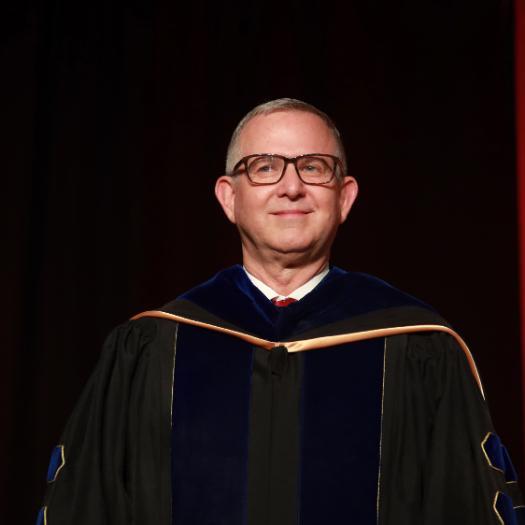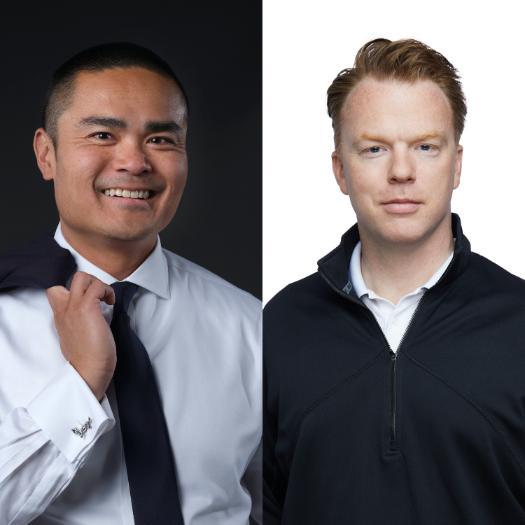 The Seattle University community is delighted at the prospect of returning to “normal” campus activity this fall, given the wide availability of a COVID-19 vaccine and our state’s progress in vaccinating residents. As we continue moving toward the light at the end of a very long tunnel, we sat down with Provost Shane Martin to hear his reflections on the university’s handling of the COVID crisis and plans for the coming academic year.
The Seattle University community is delighted at the prospect of returning to “normal” campus activity this fall, given the wide availability of a COVID-19 vaccine and our state’s progress in vaccinating residents. As we continue moving toward the light at the end of a very long tunnel, we sat down with Provost Shane Martin to hear his reflections on the university’s handling of the COVID crisis and plans for the coming academic year.
Reflecting on the 15 months that have passed since campus went into lockdown in March 2020, how do you feel things have gone overall at Seattle U?
When we look at the numbers of cases of COVID-19 in our community, among our students, faculty and staff, we've done extremely well at keeping the campus safe. Of course, I can't overstate the level of disruption COVID has caused. There’s been real frustration and disappointment in being primarily virtual this past year, yet our faculty, supported by our staff, has done a phenomenal job delivering our high-quality curriculum virtually. They’ve work so hard, just put their heads down and moved forward, and there’s been great personal cost and sacrifice—more than I think anyone knew.
What are you most proud of in Seattle U’s handling of the COVID crisis?
I'm proud of the resiliency of our community, our faculty, staff and students. No one would have chosen this. No one would have wanted this. It was frustrating and disappointing, yet people rose to the occasion and carried out our teaching and learning mission. So, I'm just very proud of our people.
What about lessons learned? Hopefully, we’ll never have to experience another pandemic. But if there is a next time, is there anything you would do differently?
Yes. I think the personal impact of COVID, its toll on relationships, the lack of in-person meetings and classes, hit people harder than anyone fully realized. If I had this to do over again, I might focus more singularly on ensuring excellence in teaching and learning, with a less ambitious agenda for implementation of our strategic plan. We did pare down our ambitions for the plan’s implementation this year, but in hindsight I believe we should have been a bit more discerning about our people's capacity to deal with a crisis and think about change for the future. It's just difficult, especially when there are so many unknowns.
So, we're moving in the direction of some sort of normal in the fall 2021. At this point, what do you anticipate the fall reopening will look like?
In the past I could tell you exactly what the fall quarter would look like. Today we’re not completely sure because we're waiting for updated guidance to Higher Education that will come from Governor Inslee this June. We’ll finalize our fall plans once we receive that guidance. For right now, we’re planning to be primarily in-person, to have our residence halls open with two people to a room, and to return to an on-campus student experience more like the pre-COVID days. Keeping our campus safe is still a top priority, and we’re enlisting multiple measures to ensure the health of our students, faculty and staff. This includes investing heavily in enhancing our HVAC systems, so we’ll have stronger filtered ventilation in classrooms and other spaces, and we’re looking for ways to enhance the deep cleaning of our facilities and to ensure the availability of disinfecting wipes and hand sanitizer throughout campus. We've modeled a plan for physical distancing in the classroom, but at this point we're not sure what the guidance will be around unmasking. We’re also requiring students to be vaccinated, and we will ask our faculty and staff to be vaccinated, as well.
Where do things stand currently regarding international students’ ability to travel to Seattle U?
In the case of international students, we're also guided by the State Department and its determination of whether it’s safe to travel to and from international locations. We’re all learning that the key to eradicating COVID-19 is vaccinating a great enough percentage of a region’s population. While the United States hasn’t fully reached this percentage, we're well ahead of many parts of the world because we’ve had greater access to vaccines than some countries. We're hoping the situation will change soon, particularly since the U.S. is pledging to provide vaccine doses for other countries.
What about the halt on university sponsored travel? When will that be lifted?
That plays through summer and will likely remain in place through fall. We’ve made the decision that there will be no study abroad through the fall quarter, unless by exception. The virus has dramatically increased in some parts of the world, and we wouldn't feel safe about having our students and faculty travel to certain countries right now.
I’d like to ask you about Seattle U’s current test optional policy. In a story that appeared in the May 2020 issue of The Voice, you stated:
“There is a growing body of evidence that suggests that standardized tests by their very nature and how they’re put together have an inherent bias. Culturally speaking, students that have had less access to the cultural capital that are referenced in these exams start out on an uneven playing field compared to those who have had more opportunities to be exposed to topics in these exams.”
That said, will Seattle U return to requiring test scores in the future?
I feel stronger than ever that standardized testing is not the way to go for us in higher education. Seattle U went test optional last May for undergraduate programs, and that will remain a permanent policy. We've extended the test optional policy another year for our master's and doctoral programs in the non-law areas, and we'll decide on whether to make that permanent after this year.
Will some courses continue to be offered virtually when campus reopens?
I believe they will for a few reasons. In some situations, a virtual or hybrid environment lends itself well to content delivery and makes a program more accessible. This is probably most true at the graduate level. Depending on where the governor's guidance lands and what our requirements will be for physical distancing, some courses may be offered online or in a hybrid format based on space availability.
Despite the uncertainty that's existed across the higher education landscape around student enrollment and retention due to COVID, Seattle U's numbers for the fall are better than projected. What do you attribute this to?
Fall enrollment numbers, based on deposits received, are considerably better than projected at this point, and I think that's due to a few factors. First, in course evaluations, our students rated the quality of their courses more highly during the COVID period than pre-COVID. So, we know they’ve had a strong, positive academic experience. Secondly, I think students are ready to come and engage with the university and with one another.
I also believe that Seattle U—who we are, our mission and our values—is the university for these times. When we look at our commitments and our work in areas like diversity, equity and inclusion, sustainability, the environment and other areas that resonate with this generation of college-bound students, Seattle U, including our location, is a place they want to be.
In your opinion, have Seattle U alumni served an ambassador role that has impacted fall enrollment numbers?
I believe our alumni play a highly significant role in Seattle University's success, and they do that in several ways. First and foremost, they do serve as ambassadors for the university by sharing their Seattle U experience with their networks and their communities, and talking with people about Seattle U. In many cases, our alumni are employers of our graduates. They also help us with internships and externships and mentor our students. As we emerge from COVID, our hope is to deepen and strengthen the university’s relationship with our alumni. They are critically important to our academic programs.

 With just a few weeks left until the close of The Campaign for the Uncommon Good, Seattle University’s largest comprehensive campaign ever, we are excited to share that we have raised over $293 million, far surpassing our $275 million goal. Seattle U alumni have played a crucial role—46 percent of all donors to the campaign are alumni.
With just a few weeks left until the close of The Campaign for the Uncommon Good, Seattle University’s largest comprehensive campaign ever, we are excited to share that we have raised over $293 million, far surpassing our $275 million goal. Seattle U alumni have played a crucial role—46 percent of all donors to the campaign are alumni.